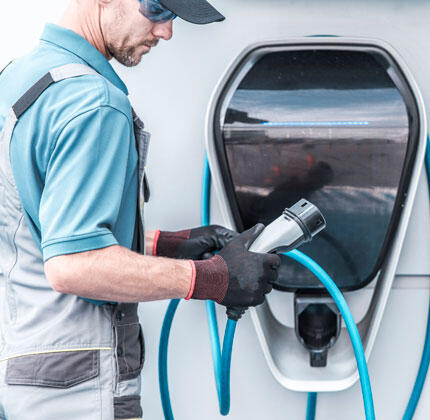Understanding Low Carbon Fuel Standard (LCFS) Credit Prices: What California EV Fleet Owners Need to Know
April 24, 2023
Fleet owners in California can earn revenue from the Low Carbon Fuel Standard (LCFS) by reducing their carbon emissions with electric vehicles. The LCFS is a market-based system where electric vehicle (EV) fleet owners can sell their LCFS credits on a state-wide market to fuel producers who are required to offset their carbon emissions. Credit generators earn one credit for every metric ton of carbon displaced by their electric vehicle, the price of which fluctuates based on the supply-and-demand of the LCFS credit market.
This article explains how Low Carbon Fuel Standard prices work and how EV fleet owners can maximize their credit earnings.
The LCFS Credit Market

EV fleet owners earn one credit for every metric ton of carbon they displace through the use of electric or other low carbon fuel-powered vehicles. These credits are resold to fuel producers.
Learn more about how the Low Carbon Fuel Standard works: Unlocking the Potential of the Low Carbon Fuel Standard in California: How the LCFS Works
These credits help incentivize clean fuel usage and advancements in green technology across California, including improvements in electric charging station infrastructure and the widespread adoption of alternative fuels. Credit prices vary based on the supply-and-demand of the market, so understanding the credit market is essential for EV fleet owners to maximize their earnings.
How Do Low Carbon Fuel Standard Credit Prices Work?

Prices of LCFS credits fluctuate based on the supply-and-demand of the credit market, with the value of credits increasing as more fuel producers generate deficits. Credit generators can maximize the value of their credits through strategic sales and by partnering with no-cost third-party aggregators like Smart Charging Technologies.
Maximizing Your LCFS Credit Prices
The value of Low Carbon Fuel Standard credits are in flux due to the supply-and-demand of the LCFS credit market. Credit generators like EV fleet owners can monitor the changes in LCFS credit values through daily updates that keep you informed on fluctuations in the market.
However, waiting for values to rise and strategizing the sale of your credits can be time-intensive, and will be unproductive for fleet owners unfamiliar with the LCFS credit market. To best maximize the value of your credit, EV fleet owners can partner with no-cost third party credit aggregators that understand the credit market and more importantly, can sell credits in bulk to fuel producers.

SCT has longstanding relations with fuel producers in California, allowing them to sell credits in bulk at consistent prices, which ensures credit generators like EV fleet owners earn the highest prices for their LCFS credits. Aggregating and selling credits to fuel producers in a consistent volume allows credit aggregators to maximize the value of LCFS credits, reducing the impact of fluctuating credit prices and earning credit generators a more consistent revenue stream for the credits.
Additionally, Smart Charging Technologies offers no-cost auditing and reporting services that ensure fleet owners are reporting their site data correctly. This removes the potential liability of misrepresenting information, which could result in punitive fines from CARB, while also guaranteeing credit generators are earning the most from their EV fleets.
Learn more about how Smart Charging Technologies’ Smart Rebates™ program can help EV fleet owners manage their LCFS credits: California’s LCFS for EV Fleet Owners
Related Posts









